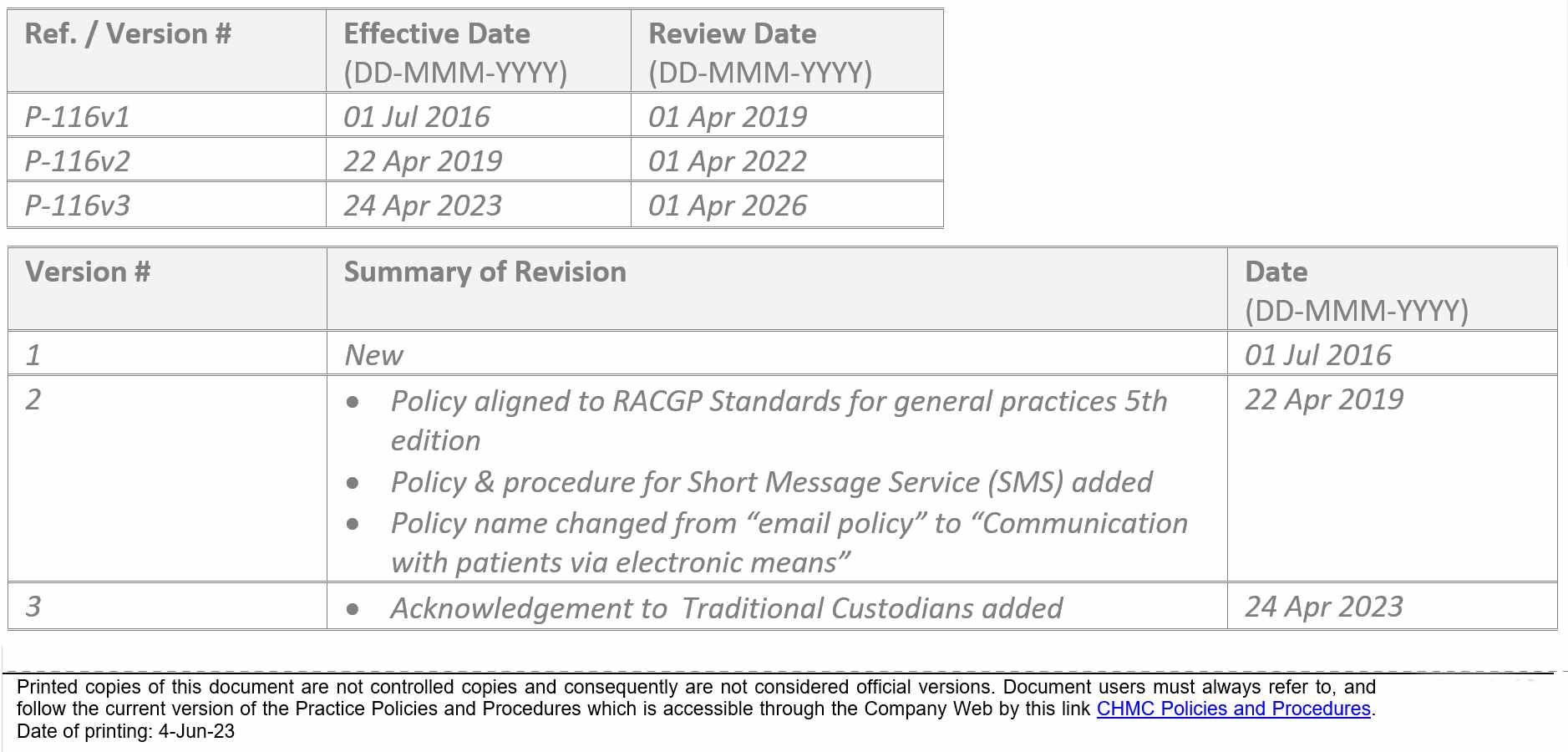
Communication with patients via electronic means
Policy
Our practice is mindful that even if patients have provided electronic contact details, they may not be proficient in communicating via electronic means and patient consent needs to be obtained before engaging in electronic communication. Electronic communication includes email, facsimile and Short Message Service (SMS).
Communication with patients via electronic means is conducted with appropriate regard to privacy
Our practice’s primary reason for communicating electronically to patients is to issue appointment reminders and we verify the correct contact details of the patient at the time of the appointment being made.
Whilst not encouraged, our practice allows patients an opportunity to obtain advice or information related to their care by electronic means, but only where the general practitioner determines that a face-to-face consultation is unnecessary and that communication by electronic means is suitable. Our practice will only provide information that is of a general, non-urgent nature and will not initiate electronic communication (other than SMS appointment reminders) with patients. Any electronic communication received from patients is also used as a method to verify the contact details we have recorded on file are correct and up-to-date.
Communication with patients via electronic means is conducted with appropriate regard to privacy. Before obtaining and documenting the patient’s consent, patients are fully informed of the risks associated with electronic communication in that the information could be intercepted or read by someone other than the intended recipient. Our practice also has an automatic email response system set up so that whenever an email is received into the practice, the sender receives an automated message reinforcing information regarding these risks.
When an email message is sent or received in the course of a person’s duties, that message is a business communication and therefore constitutes an official record. Patients are informed of any costs to be incurred as a result of the electronic advice or information being provided, and all electronic contact with patients is recorded in their health record.
All members of the practice team are made aware of our policy regarding electronic communication with patients during induction, and are reminded of this policy on an ongoing basis. They are made aware that electronic communications could be forwarded, intercepted, printed and stored by others. Each member of the practice team holds full accountability for emails sent in their name or held in their mailbox, and they are expected to utilise this communication tool in an acceptable manner. This includes, but is not limited to:
- Limiting the exchange of personal emails
- Refraining from responding to unsolicited or unwanted emails
- Deleting hoaxes or chain emails
- Email attachments from unknown senders are not to be opened
- Virus checking all email attachments
- Maintaining appropriate language within electronic communications
- Ensuring any personal opinions are clearly indicated as such, and
- Confidential information (e.g. patient information) must be encrypted.
Our practice reserves the right to check an individual’s email accounts as a precaution to fraud, viruses, workplace harassment or breaches of confidence by members of the practice team. Inappropriate use of the email facility will be fully investigated and may be grounds for dismissal.
The practice uses an email disclaimer notice on outgoing emails that are affiliated with the practice stating
The medical information, opinion or advice contained in this email is intended for the addressed recipient only. It may contain patient or other privileged and or confidential information.
If you are not the intended recipient and this email has been received by yourself in error, any use, reliance upon, disclosure to persons unintended or copying of this document is a contravention of the Privacy Act.
If this email is not addressed to you please delete it and telephone or notify the sender of this document/s as soon as possible.
We thank you for your discretion.
Crescent Head Medical Centre: PHONE (02) 6566 1712
We acknowledge the Traditional Custodians of this land and pay respect to Aboriginal and Torres Strait Islander culture, people and Elders past, present and emerging.
Crescent Head Medical Centre used Short Message Service (SMS), for the followings using Best Practice (clinical software) Messaging Service:
- Appointment Reminders
- Clinical Communication (Results and Clinical Messages)
- Clinical Reminders
Consent must be provided by an individual who has capacity to do so. In the case of minors, the Office of the Australian Information Commissioner (OAIC), the Commonwealth privacy regulator, has expressed a view that minors should be assessed on a case by case basis to determine if they have capacity to provide consent.
However, if such an approach is not practicable or reasonable, individuals aged 15 or over may be pre-sumed to have capacity to consent, unless there is something to suggest otherwise. Crescent Head Medical Centre consider an appropriate approach to seek consent from each minor when the minor turns 16. Prior to that age, practice seek consent where a minor demonstrates that he or she has capacity to consent (such as where the minor independently seeks medical assistance or treatment). Practice seeks an appropriate patient consent with shared mobile numbers.

